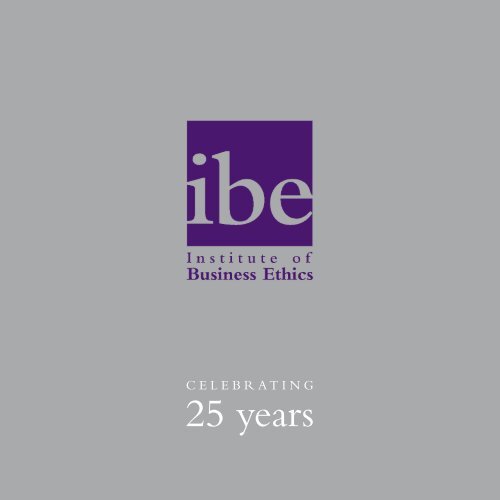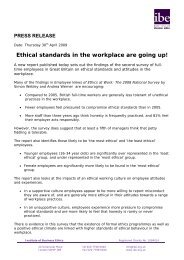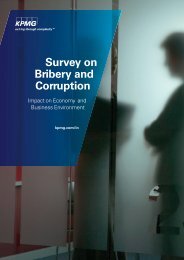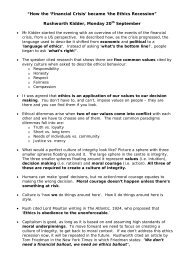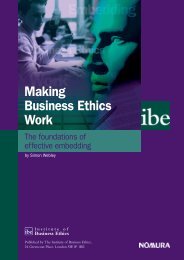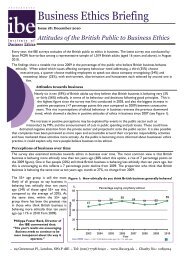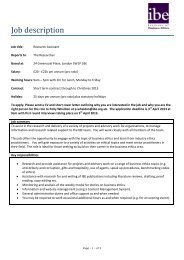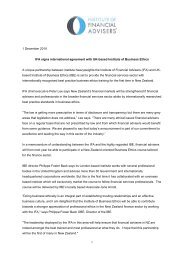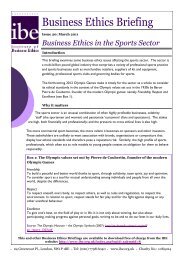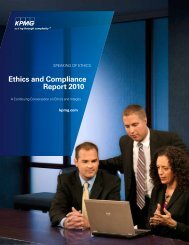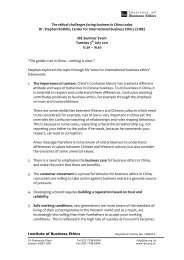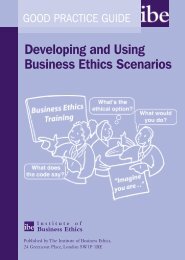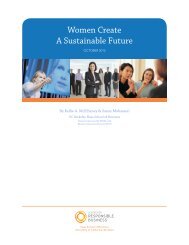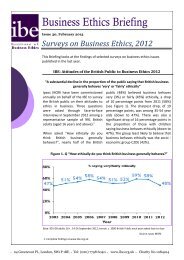here - Institute of Business Ethics
here - Institute of Business Ethics
here - Institute of Business Ethics
Create successful ePaper yourself
Turn your PDF publications into a flip-book with our unique Google optimized e-Paper software.
1<br />
c e l e b r a t i n g<br />
25 years
Contents<br />
Introduction<br />
Introduction by Philippa Foster Back OBE 1<br />
Lord Mayor <strong>of</strong> the City <strong>of</strong> London 2010-2011 2<br />
Sir Robert Worcester KBE DL 4<br />
Chris Moorhouse 5<br />
Dr Neville Bain 6<br />
Mallen Baker 7<br />
Sir Cyril Chantler 8<br />
Bernard Claude 9<br />
Andrew Crane 10<br />
John Cridland 11<br />
Keith Darcy 12<br />
Joan Dubinsky 13<br />
Kathleen Edmond 14<br />
Elizabeth Filkin 15<br />
Pr<strong>of</strong>essor David Grayson CBE 16<br />
Lord Brian Griffiths <strong>of</strong> Fforestfach 17<br />
Sir Christopher Kelly 18<br />
Rushworth Kidder 19<br />
Emmanuel Lulin 20<br />
Alison Maitland 21<br />
Lord Robert May <strong>of</strong> Oxford, OM AC FRS 22<br />
Dick Olver 23<br />
Sir John Parker 24<br />
Sir Martin Sorrell 25<br />
Toby Webb 26<br />
Patrick Zurstrassen 27<br />
IBE Timeline 28<br />
The <strong>Institute</strong> <strong>of</strong> <strong>Business</strong> <strong>Ethics</strong> was founded in<br />
1986 by businesses concerned that, following<br />
the deregulation <strong>of</strong> the City <strong>of</strong> London, ‘one’s<br />
word would no longer be one’s bond’. The Big<br />
Bang radically changed the way the London<br />
Stock Exchange operated, doing away with<br />
much <strong>of</strong> what was seen by critics as ‘the old<br />
boys’ network’ and internationalising London’s<br />
financial markets.<br />
25 years later and much has changed. London’s<br />
role as the world’s leading financial centre<br />
consolidated; technology is integrated into all <strong>of</strong><br />
our lives; global communication has torn down<br />
barriers. All these elements and more have<br />
created new ethical challenges. We have also<br />
seen the effects that a lack <strong>of</strong> ethics can have<br />
on businesses and the world economy. Enron,<br />
WorldCom, Barings, the financial crisis <strong>of</strong> the<br />
21st century – these scandals and many more<br />
have their root in poor ethical judgement and<br />
behaviours, primarily a placing <strong>of</strong> pr<strong>of</strong>it above all<br />
else, including people.<br />
As part <strong>of</strong> our celebrations <strong>of</strong> our 25th year,<br />
the IBE has asked 25 thought leaders from<br />
business, academia, politics and the ethics<br />
arena for their views on what the next 25 years<br />
have in store for business, and business ethics.<br />
What are the challenges? And how can they best<br />
be met?<br />
Their opinions are many and varied and make<br />
interesting reading. But one thing is clear:<br />
in the next 25 years, the IBE will still have a<br />
place in helping organisations achieve a deeply<br />
embedded culture <strong>of</strong> integrity, and t<strong>here</strong>fore<br />
excellence and reward.<br />
Philippa Foster Back, OBE<br />
Director, <strong>Institute</strong> <strong>of</strong> <strong>Business</strong> <strong>Ethics</strong><br />
I B E C E L E B R A T I N G 2 5 Y E A R S<br />
I B E C E L E B R A T I N G 2 5 Y E A R S<br />
2 1
“<br />
The <strong>Institute</strong> <strong>of</strong> <strong>Business</strong> <strong>Ethics</strong> has worked tirelessly<br />
since 1986 when it was launched at the Mansion<br />
House with support from the then Lord Mayor, to<br />
encourage the highest business standards based on<br />
sound ethical values.<br />
In those 25 years much has changed. We have<br />
experienced economic turmoil, unprecedented<br />
growth, increased regulation, the expanding impact<br />
<strong>of</strong> the EU.<br />
But whatever the changes, it has always been <strong>of</strong><br />
critical importance to maintain the highest standards<br />
<strong>of</strong> ethics and values in businesses <strong>of</strong> every sort.<br />
Alderman Michael Bear<br />
Lord Mayor <strong>of</strong> the City <strong>of</strong> London<br />
2010 - 2011<br />
That is as true today as it ever was. As Lord Mayor<br />
<strong>of</strong> the City <strong>of</strong> London, I was especially conscious <strong>of</strong><br />
this, representing as I did the UK financial services<br />
industry at home and overseas - an industry which<br />
inevitably suffered its share <strong>of</strong> reputational damage<br />
because <strong>of</strong> the banking crisis three years ago.<br />
That is why I launched my own initiative to examine<br />
ways <strong>of</strong> building confidence and trust in the City,<br />
an initiative in which I was delighted that the IBE<br />
participated.<br />
Our aim has been to examine current best practice<br />
and to find new ways <strong>of</strong> embedding the right<br />
behaviours and culture in every organisation and<br />
individual connected with the City.<br />
That is clearly important in itself. But if we can<br />
embed the right values more widely, we will build<br />
levels <strong>of</strong> trust with customers and clients and also<br />
sharpen the City’s competitive advantage as a global<br />
financial centre. And the same principle holds good<br />
for wider industry too.<br />
Our long term success also depends upon attracting<br />
and retaining talented people from around the world,<br />
people who want to take pride in their jobs and<br />
respect the culture in which they work.<br />
Trust and values t<strong>here</strong>fore are critical to all our<br />
stakeholders, whether in the City or elsew<strong>here</strong>, in<br />
supporting economic growth for this country.<br />
‘My word is my bond’ remains a powerful magnet<br />
for attracting business from around the world and, in<br />
the City, we are determined to continue to set the<br />
bar high in terms <strong>of</strong> integrity<br />
I thank the IBE for all it has achieved in its first 25<br />
years. I wish the <strong>Institute</strong> every success for the future,<br />
as it works to embed high standards <strong>of</strong> integrity in<br />
our wider business culture and, in so doing, enhances<br />
our national reputation as the partner <strong>of</strong> choice for<br />
the benefit <strong>of</strong> all.<br />
“<br />
I B E C E L E B R A T I N G 2 5 Y E A R S<br />
I B E C E L E B R A T I N G 2 5 Y E A R S<br />
2 3
“<br />
Over the next 25 years businesses will be facing a<br />
balancing act: balancing ethical values against human<br />
greed, balancing economic development against<br />
environmental sustainability, balancing government<br />
regulation against freedom <strong>of</strong> the individual, and<br />
balancing both governmental and business intrusion<br />
against personal privacy.<br />
Sir Robert Worcester KBE DL<br />
President, <strong>Institute</strong> <strong>of</strong> <strong>Business</strong><br />
<strong>Ethics</strong> and Founder <strong>of</strong> MORI<br />
<strong>Business</strong>es want less not more Government “I<br />
regulation. Fewer than one in three people in<br />
Britain say they trust business leaders to tell the<br />
truth. This has hardly changed over the past twentyfive<br />
years. <strong>Business</strong> ethics have not curbed human<br />
greed in the minds <strong>of</strong> the public and this makes<br />
business and its leaders easy targets for journalists and<br />
politicians.<br />
The battle between economic development opening<br />
up the green belt for houses and wind farms threaten<br />
the nation’s environmental sustainability. Examples<br />
are in the media every day <strong>of</strong> restrictions on business<br />
from health and safety enforcements. Universities<br />
and business alike believe that the application <strong>of</strong><br />
rules on immigration is too restrictive. People worry<br />
about not just governmental intrusion but now<br />
the intrusion <strong>of</strong> business generally, given advances<br />
in databases and ‘cookies’ intrusions. These are all<br />
illustrative <strong>of</strong> items which will be on boards’ agenda<br />
over the next 25 years.<br />
“<br />
believe that a general improvement in trust would<br />
be greatly beneficial to business.<br />
W<strong>here</strong> trust is missing, in business as elsew<strong>here</strong>,<br />
the result is friction, inefficiency, anxiety and<br />
additional cost. Perhaps I look back through<br />
rose-tinted spectacles, but my recollection <strong>of</strong><br />
trading real cargoes <strong>of</strong> crude oil in the early 80’s<br />
was that business was done differently then. It was<br />
a time when ‘my word was my bond’ and ‘a deal<br />
was a deal’. Mostly by telephone, then confirmed<br />
by telex, complex negotiations led to cargoes<br />
worth many millions <strong>of</strong> dollars changing hands.<br />
With regret, I now consider the more appropriate<br />
aphorism to be ‘just because you’re paranoid<br />
doesn’t mean they aren’t out to get you’.<br />
How to rebuild trust is a difficult matter. When<br />
someone or a business or institution commits<br />
to do something for us and does it, our trust in<br />
them starts to be built. Consistent delivery <strong>of</strong><br />
commitments is essential. W<strong>here</strong> failure occurs,<br />
transparency and rapid remediation may reduce the<br />
damage to trust.<br />
Chris Moorhouse<br />
Chairman, <strong>Institute</strong> <strong>of</strong> <strong>Business</strong> <strong>Ethics</strong><br />
For companies a high standard <strong>of</strong> corporate ethics<br />
consistently applied and tested at the level <strong>of</strong><br />
the individual is at the heart <strong>of</strong> improving and<br />
maintaining trust.<br />
“<br />
I B E C E L E B R A T I N G 2 5 Y E A R S<br />
I B E C E L E B R A T I N G 2 5 Y E A R S<br />
4 5
Dr Neville Bain<br />
Chairman, <strong>Institute</strong> <strong>of</strong> Directors<br />
“<br />
The increased globalisation <strong>of</strong> company activities<br />
will bring opportunities as well as challenges in the<br />
next 25 years. T<strong>here</strong> needs to be an embracing <strong>of</strong><br />
the company’s values in every part <strong>of</strong> the world it<br />
operates in. This is not about just setting down the<br />
company’s standards to be complied with but it needs<br />
to be embedded in the decision-making at every<br />
point <strong>of</strong> the world operations.<br />
With the increase in about 3 billion more people in<br />
the world and pressure on transport more workers<br />
will work from home. The company needs to plan<br />
how to monitor the decisions taken t<strong>here</strong> and that<br />
they conform to the values. Populations are largely<br />
ageing and will be living in a world <strong>of</strong> depleted<br />
resources (especially water), in a world negatively<br />
influenced by continuing global warming.<br />
Looking forward, what can today’s companies do<br />
to prepare for a future w<strong>here</strong> t<strong>here</strong> will be greater<br />
ethical and community challenges? The first thing<br />
is to review the company’s Statement <strong>of</strong> Values and<br />
to check that it is fit for purpose. Second, the board<br />
needs to have clarity that these values are being<br />
embodied in the decision-making at all levels in the<br />
business. Third, what steps can the business take to be<br />
a better corporate citizen?<br />
The future is <strong>of</strong> course unpredictable but the one<br />
certainty in my mind is the rising importance <strong>of</strong><br />
corporate behaviours, the importance <strong>of</strong> values and<br />
ethics.<br />
“<br />
“When people predict the future, they usually look<br />
at current trends and extrapolate them forwards,<br />
assuming steady improvement to be the norm. But<br />
the future landscape for business over the next 25<br />
years is going to have to cope with step changes that<br />
could take us backwards if we’re not ready for them.<br />
First, some pretty unethical businesses will grow<br />
and appear to succeed by exploiting opportunities<br />
in corrupt environments w<strong>here</strong> ethical businesses<br />
fear to tread. As the established economic powers,<br />
America and Europe, continue to decline in<br />
importance compared to the emerging forces (and<br />
this decline could be a lot more abrupt than we<br />
would expect), t<strong>here</strong> will be plenty <strong>of</strong> voices to<br />
argue that business needs to be ‘unshackled’ in order<br />
to compete against this lower global base <strong>of</strong> ethical<br />
conduct.<br />
Equally, the growing visibility and cost <strong>of</strong> climate<br />
change will increase insecurity, and lead to people<br />
valuing jobs at any cost. Persistent high costs for<br />
energy and the decline <strong>of</strong> fossil fuels will lead many<br />
to reorganise their supply chains to be more local.<br />
This will have positive and negative effects, as local<br />
jobs are created but consumers have less connection<br />
with what happens in factories the other side <strong>of</strong> the<br />
world and pressure for improvement t<strong>here</strong> disappears.<br />
None <strong>of</strong> these factors guarantee that the future is<br />
one <strong>of</strong> lower standards. But, in the likely scenario<br />
<strong>of</strong> polarised and consequently ineffective political<br />
governance, businesses will have to show real<br />
leadership to ensure the healthy societies and stable<br />
governance that they need to thrive.<br />
“<br />
Mallen Baker<br />
Writer and strategic advisor on<br />
corporate responsibility<br />
I B E C E L E B R A T I N G 2 5 Y E A R S<br />
I B E C E L E B R A T I N G 2 5 Y E A R S<br />
6 7
Sir Cyril Chantler<br />
Chairman, University College London<br />
Partners Academic Health Sciences<br />
System<br />
“<br />
In his book Humanity: A Moral History <strong>of</strong> the Twentieth<br />
Century, published in 1999, Jonathan Glover wrote:<br />
“In Europe at the start <strong>of</strong> the twentieth century most<br />
people accepted the authority <strong>of</strong> morality... At the end <strong>of</strong><br />
the century, it is hard to be confident either about the moral<br />
law or about moral progress”.<br />
In our post-modern world, organisational values<br />
seem to be too rarely developed or applied. The<br />
common law is an inadequate substitute for an<br />
ethical framework which should be part <strong>of</strong> corporate<br />
governance; we need conscience as well as contract.<br />
Indeed Adam Smith pointed out in A Theory <strong>of</strong> Moral<br />
Sentiments, which is the companion book to The<br />
Wealth <strong>of</strong> Nations, that conscience or a sense <strong>of</strong> duty<br />
was an important part <strong>of</strong> regulation. So w<strong>here</strong> are<br />
we today? I would suggest that at least in the UK<br />
we have made little progress over the last decade.<br />
Politicians’ expenses, police entertaining, press<br />
hacking and bankers greed provide a bleak picture.<br />
Someone has just coined the term ‘trickle down<br />
morality’.<br />
But times change, pendulums swing and we can<br />
learn. None <strong>of</strong> us are perfect and we all, including<br />
myself, could do better. We now need to try again to<br />
ensure that all organisations take ethics seriously and<br />
work on their values. The bigger the organisation,<br />
both public and private, the more important this<br />
is. This is why the <strong>Institute</strong> <strong>of</strong> <strong>Business</strong> <strong>Ethics</strong><br />
deserves our wholehearted support. It is a matter <strong>of</strong><br />
enlightened self-interest!<br />
“<br />
“One <strong>of</strong> the major social evolutions <strong>of</strong> recent<br />
years has been the emergence <strong>of</strong> non-commercial<br />
concerns, such as the safety <strong>of</strong> personnel or the<br />
protection <strong>of</strong> the environment, at the forefront <strong>of</strong><br />
companies’ operational strategies. Other ethical<br />
issues, such as the prevention <strong>of</strong> fraud and corruption<br />
have recently made similar progress.<br />
More difficult to measure is the link between<br />
business and human rights which has recently<br />
become more visible. The important work carried<br />
out by the UN special rapporteur on this question,<br />
validated by the Human Rights Council in 2011,<br />
clearly contributed towards clarifying the situation<br />
by forcing the UN member states and companies to<br />
meet their respective responsibilities.<br />
Bernard Claude<br />
Chairman, <strong>Ethics</strong> Committee, Total<br />
In order for these main ethical principles to be<br />
implemented on the ground, we need to move past<br />
the ‘name and shame’ approach, and to count on the<br />
active collaboration <strong>of</strong> all the involved parties. The<br />
concepts <strong>of</strong> integrity and human rights should also<br />
be considered as ethical values, and not just as risks<br />
to manage.<br />
“<br />
I B E C E L E B R A T I N G 2 5 Y E A R S<br />
I B E C E L E B R A T I N G 2 5 Y E A R S<br />
8 9
“ “<br />
Two trends will revolutionise business ethics in<br />
the next 25 years: the shifting roles <strong>of</strong> business and<br />
government and the erosion <strong>of</strong> privacy. Corporate<br />
power and influence looks destined to escalate,<br />
overtaking that <strong>of</strong> governments. Our conception <strong>of</strong><br />
the corporate sp<strong>here</strong> <strong>of</strong> interest will t<strong>here</strong>fore widen<br />
to include yet more issues <strong>of</strong> public good and even<br />
more distant stages <strong>of</strong> the value chain. And as relative<br />
scarcity becomes more acute, corporations will have<br />
to deal with conflicts in food, energy and water<br />
security.<br />
It t<strong>here</strong>fore seems likely to me that business leaders<br />
will need to embrace a tri-sector worldview<br />
that accommodates public purpose and social<br />
equity alongside economic efficiency. If, however,<br />
governments across the world radically rethink<br />
their relationships with business, we could find<br />
ourselves in a very different scenario characterised by<br />
increasingly stringent regulation curtailing corporate<br />
involvement in society.<br />
The second trend that will continue to reshape<br />
business ethics is the unstoppable force <strong>of</strong><br />
digitalisation. We can expect to see a steady escalation<br />
in privacy and security issues concerning companies.<br />
Andrew Crane<br />
George R. Gardiner Pr<strong>of</strong>essor <strong>of</strong><br />
<strong>Business</strong> <strong>Ethics</strong>, Schulich School <strong>of</strong><br />
<strong>Business</strong> at York University, Toronto<br />
In tension with demands for greater privacy<br />
protection will be countervailing pressures towards<br />
transparency and freedom <strong>of</strong> expression. I believe<br />
that the ethical challenge will be to navigate these<br />
competing forces, and to chart a responsible course<br />
towards a post-privacy digital future.<br />
“<br />
<strong>Business</strong>es know that healthy, prosperous<br />
communities are essential to their own success - and<br />
vice versa. <strong>Business</strong> ethics have come a long way<br />
over the last 25 years, and most CBI members now<br />
see them as an imperative for their future prosperity.<br />
They are also an increasingly core part <strong>of</strong> what<br />
companies do, with helping to improve society and<br />
the environment as part <strong>of</strong> their day-to-day work,<br />
not just a special project or add-on.<br />
Some <strong>of</strong> the fastest-growing companies are those<br />
who have ethical goals. They want to make a pr<strong>of</strong>it,<br />
but believe they can also make a difference in other<br />
ways while achieving this. Over the next 25 years<br />
I expect to see this attitude become even more<br />
commonplace – and that is very welcome.<br />
“<br />
John Cridland<br />
Director General, CBI<br />
I B E C E L E B R A T I N G 2 5 Y E A R S<br />
I B E C E L E B R A T I N G 2 5 Y E A R S<br />
1 0 1 1
“ “<br />
The rapid development and proliferation <strong>of</strong> smart<br />
phones, tablets, texting, tweeting, blogging, You Tube,<br />
Facebook and LinkedIn are connecting the world<br />
in ways we cannot imagine. It allows the intake and<br />
distribution <strong>of</strong> information to take place from every<br />
corner <strong>of</strong> the earth at the speed <strong>of</strong> light. It is, indeed,<br />
an age <strong>of</strong> information w<strong>here</strong> t<strong>here</strong> are no secrets and<br />
t<strong>here</strong>’s no place to hide anymore. All <strong>of</strong> our business<br />
decisions, from the executive suite to the boardroom,<br />
are now subject to a new standard – the light <strong>of</strong> day.<br />
What we are learning is that information is like<br />
a virus that requires truth, and truth demands<br />
freedom. When people become aware <strong>of</strong> alternatives<br />
revolutions occur. This is an age <strong>of</strong> revolutions.<br />
Witness the Arab Spring, the Indian Summer,<br />
WikiLeaks and the scandal at News Corp as<br />
examples. Increasingly conflicts <strong>of</strong> interest,<br />
corruption and fraud will be exposed by integrityminded<br />
people through new and expanding<br />
technologies. This will result in an emerging<br />
consciousness <strong>of</strong> capitalism and a greater sense <strong>of</strong><br />
corporate social responsibility.<br />
“<br />
Keith Darcy<br />
Executive Director, <strong>Ethics</strong> and<br />
Compliance Officers’ Association<br />
Of the many challenges facing business ethicists in<br />
the next 25 years, we must get better at asking the<br />
right questions. We have to expand our remits to<br />
cover not only individual integrity questions but also<br />
institutional integrity challenges.<br />
What does this mean? We are good at applying<br />
individual facts in complex situations to rules. Now<br />
let’s engage on those broader, more intractable – yet<br />
simpler to state – questions. How do resources<br />
come to our organisations? What do we make and<br />
sell? How do we make it? To whom do we sell it?<br />
And what do they do with it once we have sold it?<br />
Who are the business partners – up and down our<br />
supply chains – in whose company our reputations<br />
are judged? How do we know that we are making<br />
a difference in the lives <strong>of</strong> our beneficiaries and<br />
stakeholders? Have we sufficiently minimised the<br />
harm <strong>of</strong> unintended consequences that flow from<br />
even the best intentioned initiative?<br />
Joan Dubinsky<br />
Director <strong>of</strong> <strong>Ethics</strong>, United<br />
Nations<br />
As business ethicists, we cannot answer these<br />
pr<strong>of</strong>ound questions by ourselves. But we can frame<br />
these questions in ways that make them more likely<br />
to be answered. Questions that can be answered<br />
can lead to tangible – and beneficial – action. The<br />
ethical course <strong>of</strong> action for our organisations is to<br />
help repair the world that we live in. Acting ethically<br />
in an imperfect world isn’t a choice. It’s our moral<br />
imperative. And isn’t it better to act ethically than to<br />
preach to the wind.<br />
“<br />
I B E C E L E B R A T I N G 2 5 Y E A R S<br />
I B E C E L E B R A T I N G 2 5 Y E A R S<br />
1 2 1 3
“<br />
<strong>Business</strong> ethics in the USA has been more focused<br />
on legal compliance while the emphasis in Europe<br />
has traditionally been corporate/social responsibility<br />
issues. In the years ahead, I expect to see these<br />
influences cross over. I think the European business<br />
culture will adopt practices from the American<br />
model on issues related to compliance and the<br />
American culture will gradually become more<br />
attuned to social responsibility concerns and valuesbased<br />
programs.<br />
The second major trend will be continued work on<br />
anti-corruption. The next 25 years will see many<br />
new countries and regions <strong>of</strong> the world become<br />
important players in the global economy. For<br />
these developing nations to have fair access to the<br />
marketplace – and for their ordinary citizens to truly<br />
benefit from the resulting economic development<br />
– we must address bribery and corruption head<br />
on. Otherwise, the wealth <strong>of</strong> traditional economic<br />
powers and multinational corporations will simply<br />
transfer to a corrupt few, while millions <strong>of</strong> people in<br />
the general population are denied the opportunity <strong>of</strong><br />
a brighter future.<br />
Kathleen Edmond<br />
Chief <strong>Ethics</strong> Officer, Best Buy Co Inc<br />
“<br />
We have an opportunity to impact the well-being <strong>of</strong><br />
those individuals and future generations. We cannot<br />
fail them.<br />
“One<br />
<strong>of</strong> the major ethical tests for business over<br />
the next 25 years will be the implementation <strong>of</strong><br />
arrangements to help staff improve their parenting<br />
skills.<br />
Most staff in every business are parents or<br />
prospective parents. Successfully combining the<br />
roles <strong>of</strong> employee and parent brings benefits for both<br />
business and family. The disbenefits <strong>of</strong> failing to do<br />
so create costs for the businesses, families and the<br />
country as a whole.<br />
The days lost from depression and ill health flowing<br />
from inadequate parenting should be sufficient for<br />
business to act. The days lost by staff overwhelmed<br />
by the failure to manage the stress <strong>of</strong> parenting while<br />
employed should confirm its necessity.<br />
Training and support for employees to help them<br />
combine these roles should be as usual in 25 years<br />
time as health and safety training is today.<br />
“<br />
Elizabeth Filkin<br />
Former Parliamentary Commissioner<br />
for Standards<br />
I B E C E L E B R A T I N G 2 5 Y E A R S<br />
I B E C E L E B R A T I N G 2 5 Y E A R S<br />
1 4 1 5
Pr<strong>of</strong>essor David Grayson CBE<br />
Director, Doughty Centre for Corporate<br />
Responsibility, Cranfield School <strong>of</strong><br />
Management<br />
“<br />
It is sobering to realise I will be over 80 before I<br />
discover whether my predictions <strong>here</strong> are proved<br />
accurate! Long before then, however, I expect<br />
we will see further rapid advances in information<br />
and communications technologies, and in social<br />
media which, combined will make transparency<br />
an inevitability and not a management choice.<br />
Practically, that will mean consumers, employees,<br />
investors, NGOs, will be able to learn so much<br />
more in real-time, about companies and the way<br />
they behave. One writer memorably called the<br />
consequence <strong>of</strong> this the “Naked corporation!” Any<br />
company, for example, making cavalier claims about<br />
conditions in its supply chain, will find stakeholders<br />
talking directly to workers on a supplier’s factoryfloor,<br />
maybe across the world and exposing the<br />
reality real-time with photos sent from the factory<br />
worker’s mobile phone.<br />
The danger is management paralysis as managers<br />
construct audit trails in case they have to<br />
subsequently justify their behaviour. Wise<br />
companies will seek to avoid this with robust values,<br />
recruiting and appraising against those values, and<br />
effective education and training at all levels <strong>of</strong> the<br />
organisation, in ethical decision-making. This makes<br />
the work <strong>of</strong> the IBE all the more crucial. To meet the<br />
scale <strong>of</strong> future demand, that will require IBE being<br />
able to work with other providers such as business<br />
schools and management trainers.<br />
“<br />
“The last 25 years have demonstrated that free<br />
enterprise economies are superior in providing<br />
prosperity to those which are state owned and state<br />
planned. Russia, China and India have embraced<br />
the former and rejected the latter with huge success.<br />
However capitalist economies face three challenges:<br />
sustainability, inequality and cyclical instability<br />
(especially after the financial crisis). Against this<br />
background business has to address these questions,<br />
each <strong>of</strong> which has an ethical dimension.<br />
One: what is business for? Pr<strong>of</strong>it is essential but too<br />
narrow and short-term a purpose to meet people’s<br />
expectations. <strong>Business</strong> must be perceived as acting<br />
for the common good, not simply through corporate<br />
social responsibility but in the way they carry out<br />
basic, day-to-day activities. In this respect, banking<br />
and financial services have failed lamentably.<br />
Second: what more can companies do to<br />
provide jobs? Youth unemployment, long-term<br />
unemployment and low paid jobs have adverse<br />
long-term social consequences. Globalisation has<br />
highlighted the problem. We need a workforce with<br />
more ‘knowledge capital’, including what Nobel<br />
Prize winner Robert Fogel called “spiritual assets”.<br />
Lord Brian Griffiths <strong>of</strong> Fforestfach<br />
Vice-Chairman, Goldman Sachs<br />
International<br />
Will companies be expected to step in w<strong>here</strong> parents<br />
and schools have failed? <strong>Business</strong> needs to be ahead<br />
<strong>of</strong> this curve and work with government, the third<br />
sector and faith communities.<br />
Third: how competitive should our economy<br />
be? Competition has beneficial effects: efficiency,<br />
innovation, customer choice. Globalisation<br />
and deregulation have intensified competition.<br />
Arguably competitive sectors have problematic<br />
social consequences: 24/7 business agenda, work/<br />
home balance, who cares for the young and the<br />
old? <strong>Business</strong> must take the lead and not leave it<br />
to politicians who will resort to increasing the<br />
regulatory tax.<br />
I B E C E L E B R A T I N G 2 5 Y E A R S<br />
I B E C E L E B R A T I N G 2 5 Y E A R S<br />
1 6 1 7<br />
“
Sir Christopher Kelly<br />
Chairman, Committee on Standards in<br />
Public Life<br />
“<br />
The seven principles <strong>of</strong> public life – selflessness,<br />
integrity, objectivity, accountability, openness, honesty<br />
and leadership were established by the Committee<br />
on Standards in our first report. They describe the<br />
standards <strong>of</strong> behaviour expected <strong>of</strong> all politicians and<br />
civil servants who serve the public.<br />
The public might reasonably expect the same<br />
qualities in the behaviour <strong>of</strong> those they deal with<br />
elsew<strong>here</strong>. They may realise that companies may<br />
not be selfless, or even perhaps completely objective<br />
about their products. But they increasingly expect<br />
them to show integrity, to be open and honest and<br />
to be accountable – not just to shareholders. As we<br />
have seen recently, badly run companies can impact<br />
significantly on people’s lives in a variety <strong>of</strong> ways.<br />
Poor standards risk serious damage to shareholder<br />
value.<br />
Leadership is key. Almost all the issues which come<br />
to the attention <strong>of</strong> the Committee have one thing in<br />
common – a failure <strong>of</strong> leadership. When reputation<br />
and trust have already been damaged, it <strong>of</strong>ten<br />
becomes apparent that those in leadership positions<br />
had known something was wrong and failed to<br />
act. A culture which supports high standards <strong>of</strong><br />
behaviour can be supported by regulation and by<br />
transparency. But it depends on effective leadership,<br />
in any sector.<br />
“<br />
Rushworth Kidder<br />
President, <strong>Institute</strong> for Global <strong>Ethics</strong><br />
“The role <strong>of</strong> business in the coming quarter century<br />
will be to reinvent the future.<br />
As innovation escalates, companies will survive only<br />
through adaptability, flexibility, and risk-taking.<br />
Naturally, then, a significant portion <strong>of</strong> corporate<br />
decision-making will take place ahead <strong>of</strong> the legal<br />
and regulatory curve, in uncharted territory w<strong>here</strong><br />
compliance has yet to take hold. In that space, the<br />
temptation to take unethical decisions and actions<br />
will be stronger than ever. But the demand for<br />
transparency is also escalating, as the public grows<br />
increasingly concerned about failures <strong>of</strong> integrity.<br />
Companies that wrongly conflate ethics with<br />
compliance – falling for the fallacy that ‘If it’s not<br />
illegal, it must be ethical’ – risk sudden, unforeseen<br />
smash-ups against the wall <strong>of</strong> public moral outrage<br />
when their deeds come to light. But companies<br />
that use ethics as a predictive tool – developing<br />
the capacity to foresee ethical challenges over the<br />
horizon before they happen – will prove to be<br />
sustainable. In a world <strong>of</strong> enormous transparency,<br />
companies that win the reputational race will be<br />
those whose moral courage is matched by their<br />
moral futurism.<br />
“<br />
I B E C E L E B R A T I N G 2 5 Y E A R S<br />
I B E C E L E B R A T I N G 2 5 Y E A R S<br />
1 8 1 9
“<br />
It is highly likely that the world in 2036 will be very “The<br />
different from what it is today. Many <strong>of</strong> our familiar<br />
assumptions (inevitable globalisation, increased<br />
consumption, cheap capital, readily available natural<br />
resources, technology being seen as a source <strong>of</strong><br />
progress, etc.) are already seriously challenged.<br />
The very model <strong>of</strong> private, lowly regulated<br />
enterprise is being called into question by the success<br />
<strong>of</strong> the currently state-controlled economies <strong>of</strong> China,<br />
India and Brazil and the present financial crisis.<br />
With challenge comes opportunity and the role<br />
<strong>of</strong> ethics in business will grow if it is able to help<br />
companies address the dilemmas which will arise in<br />
this new landscape.<br />
This will mean that the field <strong>of</strong> business ethics will<br />
need to expand, from dealing with predominantly<br />
individual integrity issues and reactive compliance to<br />
proactive strategic business planning.<br />
<strong>Business</strong> ethics will also draw more on the two sides<br />
<strong>of</strong> the brain, both rational and emotional.<br />
In the short term, it will be interesting to see how<br />
business ethics will develop in emerging markets.<br />
The recent developments in Korea, the Philippines,<br />
Emmanuel Lulin<br />
Group Director <strong>of</strong> <strong>Ethics</strong>, L’Oréal<br />
India and China appear promising but how business<br />
ethics will fare over the longer term and how it will<br />
develop in Latin America and Africa remains largely<br />
unpredictable.<br />
With the newly and hard-earned legitimacy <strong>of</strong><br />
economic success, emerged economies will invite<br />
themselves to the business ethics table to challenge<br />
established paradigms and ‘timeless’ references.<br />
In any case, it will be a fascinating journey for our<br />
generation and it will no doubt attract many young<br />
talents to a new pr<strong>of</strong>ession.<br />
“<br />
way we work will undergo a huge<br />
transformation, fuelled by the explosion in<br />
communications technology, globalisation, shifting<br />
demographics, and changing social attitudes. As<br />
work becomes more individualised, and the location<br />
<strong>of</strong> work less important, businesses will be judged on<br />
their ability to create and sustain work communities<br />
with common values. The ability to build trust<br />
between people who collaborate but rarely see each<br />
other will be a crucial test for managers. As more<br />
work goes to arms-length contractors, will businesses<br />
be responsible for their ethical behaviour, or will<br />
they turn a blind eye?<br />
The shift in economic power towards the East and<br />
South will raise questions about whether companies<br />
in advanced economies continue to impose their<br />
business culture on emerging markets or adapt<br />
to alternative ways <strong>of</strong> doing business. The ease <strong>of</strong><br />
outsourcing services online will mean that employers<br />
can cut costs by using low-paid agents rather than<br />
regular employees. But exploitation will also be more<br />
quickly exposed through social media and rapid<br />
connectivity.<br />
Socio-economic and digital divides may widen.<br />
Ethical businesses will be those that design work<br />
to integrate the marginalised as well as the highly<br />
skilled. This applies, too, to the way businesses<br />
respond to the ageing labour force, adopting more<br />
flexible career models that fit the extension <strong>of</strong><br />
working lives.<br />
Alison Maitland<br />
Journalist and co-author <strong>of</strong> Future Work<br />
I B E C E L E B R A T I N G 2 5 Y E A R S<br />
I B E C E L E B R A T I N G 2 5 Y E A R S<br />
2 0 2 1<br />
“
Lord Robert May <strong>of</strong> Oxford,<br />
OM AC FRS<br />
Former President <strong>of</strong> the Royal Society<br />
and Chief Scientific Advisor to the UK<br />
Government<br />
“<br />
The essential purpose <strong>of</strong> banks, or more<br />
generally <strong>of</strong> financial markets, is the efficient<br />
allocation <strong>of</strong> investment capital. Recent events<br />
demonstrate that this purpose is far from being<br />
fulfilled by the present system. Instead <strong>of</strong> due<br />
regard to ‘duty <strong>of</strong> care’ to clients, recent years have<br />
seen unprecedented increases in levels <strong>of</strong> leverage<br />
and risk, arguably driven by bankers’ concern<br />
with their own patterns <strong>of</strong> remuneration. This is<br />
underlined by Harvard’s distinguished economist<br />
Benjamin Friedman’s assessment that in the USA<br />
30 years ago “the cost <strong>of</strong> running the financial system<br />
was 10% <strong>of</strong> all <strong>of</strong> the pr<strong>of</strong>its earned in America”. This<br />
rose to 20-25% 15 years ago. And just before the<br />
crisis hit, “running the financial system took one-third<br />
<strong>of</strong> all pr<strong>of</strong>its earned on investment capital”. So, as my<br />
suggestion for the major challenge for business and<br />
business ethics, I echo Friedman: “The time has come<br />
for a serious evaluation <strong>of</strong> the costs and benefits <strong>of</strong> running<br />
our financial system”.<br />
“<br />
“<br />
I cannot emphasise strongly enough how critical it<br />
is that the highest standards <strong>of</strong> business ethics remain<br />
forefront <strong>of</strong> the business agenda.<br />
When you look back upon developments over<br />
the last 25 years, progress has certainly been made;<br />
however, we cannot rest upon our laurels as t<strong>here</strong> is<br />
always room for improvement. We must continue<br />
to push forward. Over the next 25 years, I believe<br />
businesses will need to continue to evolve from<br />
focusing upon compliance to a more proactive stance<br />
w<strong>here</strong> the critical importance <strong>of</strong> business ethics will<br />
be recognised as a given. Issues like openness and<br />
transparency will continue to play leading roles in<br />
all facets <strong>of</strong> decision making as expectations around<br />
business ethics will become as prevalent in the future<br />
as expectations are today around issues like safety.<br />
<strong>Business</strong> leaders will increasingly be held more<br />
personally accountable not just for their own actions,<br />
but also for those <strong>of</strong> others within their organisations.<br />
Dick Olver<br />
Chairman, BAE Systems<br />
As the world becomes smaller in this global age and<br />
as organisational cultures thus continuously change,<br />
responsible businesses will need to better discern<br />
how to apply the philosophy behind business ethics<br />
to their increasingly diverse workforces. To best<br />
address these challenges, I believe we must maintain<br />
the highest standards and ensure our businesses<br />
continue to fully adopt and then live by the values<br />
and principles espoused by the <strong>Institute</strong> <strong>of</strong> <strong>Business</strong><br />
<strong>Ethics</strong>.<br />
“<br />
I B E C E L E B R A T I N G 2 5 Y E A R S<br />
I B E C E L E B R A T I N G 2 5 Y E A R S<br />
2 2 2 3
“<br />
Connecting to the world around us has never been “The<br />
easier. Each day, more and more individuals are<br />
connecting with each other and with businesses and<br />
organisations through social networks. For millions,<br />
‘social media’ is the communication channel <strong>of</strong><br />
choice.<br />
However, businesses are <strong>of</strong>ten wary <strong>of</strong> joining these<br />
‘open’ networks. Many fear that poor business<br />
conduct can be exposed via these channels, resulting<br />
in long-term damage to reputation. However, any<br />
business interested in building trust must consider<br />
the benefits <strong>of</strong> embracing social media as an ethics<br />
tool that forms an essential part <strong>of</strong> a communication<br />
strategy.<br />
With the increase <strong>of</strong> global information sharing<br />
through social media, t<strong>here</strong> is a surging demand from<br />
society for companies to conduct business ethically.<br />
For a business to secure its licence to operate, it must<br />
explain its social purpose to a diverse audience. It<br />
must engage with them on important issues by using<br />
the most effective communication channel. If not,<br />
our stakeholders will have the conversation anyway<br />
online, with the business losing the opportunity to<br />
influence discussion.<br />
Sir John Parker<br />
Chairman, National Grid and Anglo<br />
American<br />
Social media provides a real-time barometer <strong>of</strong><br />
stakeholder sentiment to monitor compliance with<br />
ethical policies, and provides opportunities to act on<br />
emerging ethical issues sooner.<br />
“<br />
next 25 years will see a progressive transfer <strong>of</strong><br />
power – financial and political – from the West to the<br />
East, South and South East. This will impact many<br />
aspects <strong>of</strong> society and business including the norms<br />
<strong>of</strong> business governance and ethics. Historically the<br />
West has tended to distrust governance <strong>of</strong> business<br />
in these regions, characterising it as a high risk<br />
environment with low regard for ethics, employment<br />
standards and environmental protection. Some <strong>of</strong><br />
this criticism is warranted but much is misjudged.<br />
My own experience shows me that most business<br />
people and politicians in emerging economies are<br />
as enthusiastic as anyone to establish stable, properly<br />
run markets w<strong>here</strong> investors are protected and a<br />
responsible relationship exists with society and the<br />
environment. The challenge for all global business<br />
leaders – w<strong>here</strong>ver they originate - is to avoid a race<br />
to the bottom. We need to identify the best aspects<br />
<strong>of</strong> all business cultures and learn from the weaknesses<br />
evident in governance and business ethics around the<br />
world. The result will be stronger businesses, trusted<br />
by the customers and societies they serve.<br />
“<br />
Sir Martin Sorrell<br />
Chief Executive, WPP<br />
I B E C E L E B R A T I N G 2 5 Y E A R S<br />
I B E C E L E B R A T I N G 2 5 Y E A R S<br />
2 4 2 5
“<br />
From my research with customers, readers and<br />
others, t<strong>here</strong> seems to be seven long-term challenges<br />
and opportunities which companies will struggle<br />
with for the next two and half decades.<br />
These are:<br />
1. B2B collaboration on sustainability, with<br />
competitors, partners and suppliers<br />
2. The business case, particularly around internal<br />
and external behavioural change<br />
3. Engaging with campaign groups<br />
4. Corporate reputation and new/evolving media<br />
5. Company strategy and process, product, design<br />
and manufacturing innovation<br />
6. <strong>Business</strong> contributions to tackling bribery and<br />
corruption<br />
7. Corporate contributions to development, policy<br />
and institutional frameworks.<br />
These are not the only challenges. They lie alongside<br />
global macro problems such as energy, resource<br />
scarcity, environmental degradation, population<br />
growth, political engagement and uncertainty, and <strong>of</strong><br />
course macro and micro economic issues.<br />
From my list <strong>of</strong> seven above, t<strong>here</strong>’s one cross-cutting<br />
paradigm which will lead any business to tackle their<br />
salient risks and capitalise on their opportunities.<br />
Toby Webb<br />
Founder, Ethical Corporation and CEO<br />
Stakeholder Intelligence<br />
That’s the understanding that innovation is<br />
engagement.<br />
Engagement means understanding that business models<br />
and t<strong>here</strong>fore systems will need to be fundamentally<br />
re-engineered to meet the needs <strong>of</strong> the near future.<br />
Engagement with other firms, with NGOs, with<br />
policymakers, politicians and industry groups.<br />
Engagement with employees, CEOs and academia.<br />
“<br />
We know more now than ever before. That knowledge<br />
can be put to better use than it is today. T<strong>here</strong>in lies<br />
the opportunity.<br />
“Disaffection towards companies is nowadays<br />
important and acting ethically is becoming a topical<br />
issue also for board members. Beyond transparency,<br />
ethics in the company first consists in developing the<br />
concept <strong>of</strong> responsibility. It is not about ticking boxes<br />
but about finding the right relation between ethical<br />
principles and concepts like identity, culture, or the<br />
soul <strong>of</strong> the company.<br />
As part <strong>of</strong> the corporate strategy, board members<br />
have to think about the ethical principles <strong>of</strong> a<br />
company, to formalise them and to find consistency<br />
with the intimate character <strong>of</strong> the company.<br />
Principles do not have to be interchangeable from<br />
one company to another, but express the identity<br />
and the singularity <strong>of</strong> the company according to its<br />
pr<strong>of</strong>essions and to its markets. T<strong>here</strong>fore if Codes<br />
<strong>of</strong> Conduct can fix the basic principles, they don’t<br />
prevent a deep reflection within boardrooms to<br />
define a suitable approach for a specific company.<br />
<strong>Ethics</strong> should also be seen as a tool to promote<br />
innovation and to shift from short-term thinking<br />
to long-term planning and anticipation. Reflection<br />
is still needed on w<strong>here</strong> does the role <strong>of</strong> the<br />
board start and stop when it goes to CSR and<br />
human resources in order not to overlap with the<br />
management duties.<br />
Patrick Zurstrassen<br />
Chairman, ecoDa, The European<br />
Voice <strong>of</strong> Board Directors<br />
I B E C E L E B R A T I N G 2 5 Y E A R S<br />
I B E C E L E B R A T I N G 2 5 Y E A R S<br />
2 6 2 7<br />
“
986 2004<br />
IBE Timeline<br />
25 years <strong>of</strong> promoting good practice in business ethics<br />
The <strong>Institute</strong><br />
<strong>of</strong> <strong>Business</strong><br />
<strong>Ethics</strong> was<br />
launched.<br />
Founding<br />
subscribers<br />
include:<br />
Barclays Bank,<br />
BP, Esso,<br />
Lloyds Bank,<br />
Midland Bank,<br />
Royal Bank <strong>of</strong><br />
Scotland & SG<br />
Warburg & Co.<br />
Introduced the<br />
first regular<br />
survey and<br />
analysis <strong>of</strong> the<br />
use <strong>of</strong> codes<br />
<strong>of</strong> ethics by<br />
major UK<br />
companies.<br />
We continue<br />
to carry out<br />
this survey<br />
every 3 years.<br />
Produced the<br />
first definitive<br />
guide to<br />
developing<br />
a code <strong>of</strong><br />
business<br />
ethics.<br />
Published a<br />
report on<br />
the business<br />
case for<br />
environmental<br />
policies <strong>Ethics</strong>,<br />
Environment &<br />
the Company.<br />
IBE’s<br />
examination<br />
<strong>of</strong> business<br />
ethics in a<br />
globalised<br />
world Codes<br />
<strong>of</strong> <strong>Ethics</strong> and<br />
International<br />
<strong>Business</strong><br />
published.<br />
Ethical<br />
Aspects <strong>of</strong><br />
Information<br />
Technology<br />
published.<br />
<strong>Business</strong><br />
<strong>Ethics</strong><br />
Network<br />
established<br />
for large<br />
corporate<br />
subscribers<br />
to provide a<br />
confidential<br />
forum<br />
for those<br />
responsible<br />
for business<br />
ethics.<br />
Subscription<br />
opened to<br />
individuals.<br />
First training<br />
course,<br />
Introduction<br />
to <strong>Business</strong><br />
<strong>Ethics</strong><br />
launched.<br />
First<br />
Directors’<br />
<strong>Business</strong><br />
<strong>Ethics</strong><br />
Breakfast<br />
held – an<br />
intimate<br />
forum for<br />
senior<br />
executives<br />
to discuss<br />
ethical<br />
issues.<br />
Published<br />
research<br />
linking<br />
business<br />
ethics and<br />
financial<br />
performance:<br />
Does<br />
<strong>Business</strong><br />
<strong>Ethics</strong> Pay?<br />
Launch<br />
<strong>of</strong> annual<br />
student essay<br />
award.<br />
Instigated<br />
an annual<br />
international<br />
conference<br />
on business<br />
ethics in<br />
partnership<br />
with European<br />
and American<br />
business<br />
ethics<br />
organisations:<br />
European<br />
<strong>Business</strong><br />
<strong>Ethics</strong> Forum<br />
(www.ebef.eu).<br />
1986<br />
1988<br />
1990<br />
1997<br />
1998<br />
2000<br />
2001<br />
2002 2003 2004<br />
2 8<br />
2 9
581 IBE Trust Report COVER.qxl:Layout 1 20/6/11 12:20 Page 1<br />
Conducted<br />
an inaugural<br />
national<br />
survey <strong>of</strong> the<br />
attitude <strong>of</strong> UK<br />
employees to<br />
ethics in the<br />
workplace. We<br />
continue to<br />
carry out this<br />
survey every<br />
3 years. The<br />
third survey,<br />
including some<br />
European<br />
countries,<br />
will be run in<br />
2012.<br />
2005<br />
005 future<br />
IBE Timeline<br />
<strong>Business</strong> <strong>Ethics</strong> Briefing<br />
Launch <strong>of</strong><br />
IBE <strong>Business</strong><br />
Briefings:<br />
concise<br />
information<br />
and good<br />
practice<br />
guidance on<br />
a variety <strong>of</strong><br />
business<br />
ethics topics,<br />
free to<br />
view and<br />
download from<br />
www.ibe.org.uk<br />
How important is organisational culture in ethical behaviour? – a US perspective<br />
ERC National <strong>Business</strong> <strong>Ethics</strong> Survey, 2005 (US)<br />
The US-based <strong>Ethics</strong> Resource Center (ERC) carries out National <strong>Business</strong> <strong>Ethics</strong> Surveys asking employees<br />
about ethics at their workplace. The 2005 survey found that formal ethics programmes were frequently found<br />
in companies, positive outcomes, such as employee willingness to report misconduct and pressure to<br />
compromise standards, were not. The ERC concluded that contextual organisational culture is more influential<br />
in determining outcomes.<br />
A strong ethical culture is needed to achieve positive outcomes from those programmes; including the<br />
Formal programmes play a key role in the creation and maintenance <strong>of</strong> a strong ethical culture.<br />
W<strong>here</strong> top management displays certain ethics-related actions, employees are 50% less likely to have<br />
<strong>Ethics</strong>-related actions <strong>of</strong> co-workers can increase employee willingness to report misconduct, by as much as<br />
When employees perceive that others are held accountable for their actions, their overall satisfaction with<br />
Formal ethics programmes have most impact in weak ethical cultures.<br />
actions <strong>of</strong> leaders and peers.<br />
observed misconduct.<br />
10 percentage points.<br />
the organisation they work for increases by 32%.<br />
The full report and executive summary are available from: http://tinyurl.com/35gqnjm<br />
2006<br />
Date: March 2006 Issue 1<br />
SURVEY FINDINGS 2005:<br />
ethical conduct within business<br />
This briefing presents a synopsis <strong>of</strong> the findings <strong>of</strong> selected 2005 surveys <strong>of</strong> public and<br />
employee perception <strong>of</strong> ethical conduct within business in the UK and the US.<br />
What is the UK public’s perception <strong>of</strong> ethics in business?<br />
IBE survey on ‘<strong>Business</strong> <strong>Ethics</strong>: General Trends in Public Perception’: included in the MORI omnibus survey <strong>of</strong> the UK public, September<br />
2005.<br />
When asked to select from a list <strong>of</strong> ethical issues which most needed addressing by business, the three highest<br />
priorities, raised by about a third <strong>of</strong> those asked, were:<br />
Enabling employees to speak out about wrong doing<br />
Preventing discrimination. Younger people felt particularly strongly about this (42% <strong>of</strong> 15-24 year olds)<br />
Environmental responsibility<br />
Executive Pay, the most common concern in 2004, fell from being a concern <strong>of</strong> 40% to just 25% <strong>of</strong> the<br />
respondents.<br />
When asked if British business behaves ethically, a comparison with the previous 2 years suggests that:<br />
Public perception <strong>of</strong> business behaviour is improving. In 2005, 54% thought that British business behaves<br />
ethically, up seven points since 2003.<br />
Nevertheless, the perception <strong>of</strong> most people is that the ethics <strong>of</strong> business behaviour has not changed in the last<br />
year (55%). Only 12% think British business is behaving more ethically compared to a year ago, and 11% think<br />
it is less ethical.<br />
Are business leaders trusted by the public?<br />
BMA/MORI annual po l on trustworthy pr<strong>of</strong>essions<br />
A stratified sample <strong>of</strong> 2000 members <strong>of</strong> the British public<br />
are asked which pr<strong>of</strong>ession they trust to tell the truth.<br />
Trust in business leaders continues so be low (24%), with<br />
only politicians and journalists ranked below them.<br />
Further information can be found under:<br />
http://tinyurl.com/398ujrz<br />
The first in the<br />
Good Practice<br />
Guide series<br />
launched with<br />
Speak Up<br />
Procedures.<br />
... Doing business ethically<br />
… makes for better business<br />
2007<br />
IBE’s director<br />
is a member<br />
<strong>of</strong> the Woolf<br />
Committee;<br />
The Woolf<br />
Report is<br />
published.<br />
2008<br />
7915 IBE E-Learning - Leaflet:Layout 1 15/10/09 10:25 Page 1<br />
Launch <strong>of</strong><br />
e-learning<br />
tool kit<br />
Understanding<br />
<strong>Business</strong><br />
<strong>Ethics</strong>.<br />
2009<br />
Price £10<br />
Content for this CD Rom was<br />
supplied by the <strong>Institute</strong> <strong>of</strong><br />
<strong>Business</strong> <strong>Ethics</strong>. It was<br />
produced by SAI Global.<br />
IBE addresses<br />
the demand<br />
for business<br />
ethics<br />
training and<br />
INTRODUCTION advisory work TO<br />
internationally<br />
BUSINESS ETHICS<br />
through its<br />
first <strong>of</strong>fshore<br />
Building and<br />
Restoring<br />
Organisational Trust<br />
Published by The <strong>Institute</strong> <strong>of</strong> <strong>Business</strong> <strong>Ethics</strong>,<br />
24 Greencoat Place, London SW1P 1BE<br />
Trust,<br />
What representation is business<br />
in New<br />
ethics<br />
Zealand.<br />
and why<br />
launched.<br />
is<br />
doing the right<br />
thing important?<br />
This engaging e-learning tool will:<br />
2010<br />
2011<br />
• raise awareness <strong>of</strong> what business ethics<br />
is about,<br />
• help staff and business partners<br />
3 0<br />
understand why ethical values in the<br />
3 1<br />
By Graham Dietz and Nicole Gillespie<br />
workplace matter, and<br />
• guide employees in recognising and<br />
Building and<br />
Restoring<br />
Organisational<br />
IBE’s 50th<br />
publication,<br />
Our key challenge is to meet the<br />
needs <strong>of</strong> organisations as pressure<br />
is placed upon their ability to do<br />
business ethically.<br />
The Future
Designed and produced by Navigate 01730 235666 www.navigate-design.com<br />
3 2<br />
24 Greencoat Place, London SW1P 1BE<br />
Tel: +44 (0)20 7798 6040 Fax: +44 (0)20 7798 6044 Email: info@ibe.org.uk www.ibe.org.uk


